Ron DeSantis' Quiet Relationship with Amazon
“What I can say on behalf of Florida to companies like Amazon: We welcome you to come to Florida,” said Florida Governor Ron DeSantis in 2019. He has since clammed up.
Welcome to BIG, a newsletter on the politics of monopoly power. If you’re already signed up, great! If you’d like to sign up and receive issues over email, you can do so here.
For the last five years, the Republican Party has been in a tense internal debate over its relationship with corporate America. With the Republicans about to take over part of Congress, and a coming debate over their Presidential nominee, this issue could become explosive.
So that’s what I’m writing about today. How real is the anger at big business on the right? And how are conservative politicians wielding this anti-corporate rhetoric? To answer that question, I’m looking at possible Trump challenger Ron DeSantis and his quiet relationship with Amazon, and more broadly, corporate America.
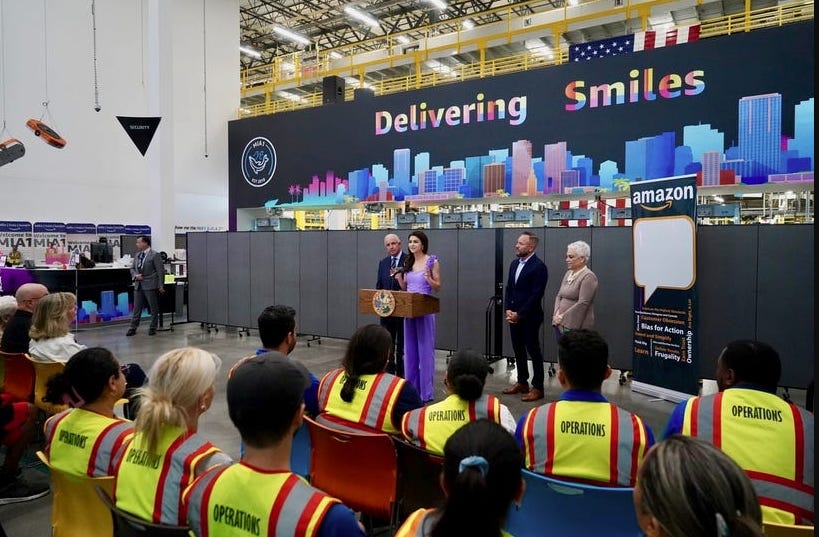
Too Woke to Fail
One of the constant themes of this newsletter has been the conflict on the conservative side of the aisle over corporate power. The emergence of a genuine anti-monopoly faction on the right has been gradual, but it exists for a simple reason: Republican voters themselves have turned hostile to large corporations.
Despite skepticism many on the left have about this phenomenon, the anti-corporate sentiment isn’t fake, and it is having an impact on parts of the Republican Party in D.C. For instance, a little over a month ago, 39 Republican House members, led by conservative House member Ken Buck and encouraged by Senators Tom Cotton, Chuck Grassley, and Mike Lee, as well as the the Heritage Foundation, defied their leadership and voted to pass stronger antitrust law.
It’s more than just Congress. Last year, conservative Supreme Court Justice Clarence Thomas, attacked the power of dominant firms, arguing monopoly power was upstream from censorship. Texas Republican Ken Paxton is leading a suit to break up Google, and Ohio Attorney General David Yost is seeking to have Google declared a public utility. I could go on, suffice to say there’s a lot of evidence that a faction on the right is disdainful that monopoly power exists.
And yet, the GOP has long been the party of big business, and that tradition hasn’t gone away. The new House Speaker will be tech-friendly Republican Kevin McCarthy, and the most powerful House conservative will be Google’s strongest ally in Congress, Jim Jordan, who will chair the House Judiciary Committee, which has jurisdiction over antitrust. The tension on the right will get more intense next Congress, as the traditional big business-friendly establishment will lock horns with these new anti-monopolists.
This transition on the right is also going to play out in the GOP primary, which in some ways will begin overshadowing Congressional action fairly soon. In 2016, Trump attacked big business, offering a chaotic anti-establishment message. While corporate concentration increased under Trump, his administration was not without anti-monopoly successes. For instance, during Operation Warp Speed to create Covid vaccines, the White House handed out contracts to not just one but six pharmaceutical firms, which meant there was actually competition. Under Attorney General Bill Barr, the Antitrust Division brought the first monopolization suit in 20 years, against Google. And the Trump FTC also brought a monopolization suit against Facebook.
Trump’s anger at Big Tech, considering he was de-platformed, has only risen. Still, his policy track record was not consistent. Trump routinely attacked Jeff Bezos, but he absolutely loved when big tech stock prices soared. I do not know how Trump will run his 2024 campaign, but corporate power will likely again fit in.
The other key actor on the right is Florida Governor Ron DeSantis, who is one of Trump’s most likely rivals for the Republican nomination. And DeSantis, following Trump, has a track record of putting big corporations on the defensive, most famously Disney. Unlike Trump, who bashed firms like Carrier for offshoring jobs, DeSantis’ disdain for corporations is much narrower, focusing only on conflicts over ‘woke' capital.
DeSantis is also cross-pressured on corporate power, perhaps even more so than Trump. Despite the anti-corporate rhetoric, 42 billionaires have given DeSantis money. According to one GOP operative quoted by Semafor, “the established donor class is behind DeSantis more than Trump.” DeSantis raised a record $190 million for his reelection campaign, and is set to harvest much much more. To understand why, it helps to look at how DeSantis acts when he’s not in the spotlight. In particular, it’s useful to examine his relationship with Amazon.
Amazon is hated on the right as a bulwark of progressivism. For instance, to pick a random example, GOP icon Tucker Carlson recently characterized the firm’s behavior as ‘modern-day book burning.’ And you can find an endless number of right-wing critiques. Conservatives distrust Amazon.
An association with the tech giant can be toxic for high-profile GOP politicians. So those who want a relationship with Amazon link themselves in more subtle ways that conservatives won’t notice. For instance, Virginia Governor Glenn Youngkin, a potential 2024 Presidential nominee, quietly sent his wife to the opening of an Amazon Web Services skills center three weeks ago. He also appointed Jeffrey Palmore to be chairman of the Virginia Compensation Board, which sets pay for the various state officials overseeing Amazon’s financial concessions from the state. Amazon then immediately hired Palmore, giving the firm immense leverage over the government officials making decisions about how much Amazon profits. These pro-Amazon signals aren’t such a big deal for Youngkin, as he’s less a populist and more a wealthy plaid pants wearing finance dork. No one’s shocked by a Carlyle Group exec doing nice things for Amazon.
DeSantis is cut from different cloth. He is not wealthy, with a net worth of only $318,000, stunningly low for a politician. (And it actually dropped last year in office.) DeSantis has positioned himself as a socially conservative quasi-populist, a guy who won’t take guff from ‘woke’ corporate America. And yet, he’s done something similar to Youngkin, and through appointments and quiet signals, shown that he values a connection with Amazon.
But first, let’s start with his public image. Over the last year, DeSantis has become nationally known for attacking Disney over the corporation’s opposition to a Florida education law barring the teaching of certain forms of sex education and gender norms in schools. “You have companies, like a Disney, that are going to say, and criticize, parents’ rights,” DeSantis said in March. “They’re going to criticize the fact that we don’t want transgenderism in kindergarten and first-grade classrooms.”
That wasn’t the end of his anti-corporate kick. DeSantis then prohibited cruise lines from verifying the vaccination status of customers, blocked state subsidies to the Tampa Bay Rays after they donated to a gun violence prevention program, and attacked corporate diversity training. “We will not let the far-left woke agenda take over our schools and workplaces,” he said.
And yet, there hasn’t been any real damage to any of these corporations. Disney, for instance, has had a special self-governing status for its central Florida theme park area since the 1960s. DeSantis pushed through a bill revoking it as punishment for Disney’s actions. What matters, however, is not something symbolic, but whether the replacement legal authority will harm Disney. The bonds of ‘Reedy Creek,’ as Disney’s special self-governing district is known, are still rated highly. And last week, it came out that Florida will not in fact be imposing any punishment on Disney at all.
DeSantis denies this report, and his spokespeople say he’ll exact something from Disney. Still, despite the attack on Reedy Creek, DeSantis left the firm mostly untouched. The Florida Governor did not have his counsel look into Disney’s market power over Florida’s movie theater box office or streaming market, or into its deceptive anti-consumer practices at Disney’s theme parks. The heavy weaponry went unused. (I’m not making the argument that he should have penalized to Disney, only that he said he would but as of yet has not.)
DeSantis’ opponents in Florida call his behavior ‘performative’ and ‘theatrics.’ It’s not clear, however, if DeSantis is genuinely leery of attacking big business, or if he is still in the midst of changing his mind. We are in a moment of transition, so I think it’s quite possible he’s rethinking the role of corporate power in American life. Many are. And there is some evidence for that shift. In June, for instance, DeSantis highlighted a minor state action he was taking against the monopolistic pharmacy benefit management industry, and a few days ago he pulled two billion dollars of Florida’s money from asset manager BlackRock.
But if it is the case DeSantis has taken a genuine turn against corporate power in policy terms, that would be a change. Take the Amazon second headquarter contest a few years ago. From 2018-2019, Amazon put up an auction for which city would offer enough tax incentives to receive 50,000 jobs from the high-tech firm. Over 200 cities applied, and New York City and Northern Virginia, aka the Pentagon’s home town, won.
But then local political leaders in New York balked at Amazon’s tactics, particularly its labor policies. Amazon founder Jeff Bezos decided to withdraw from the Big Apple. DeSantis then tried to draw Amazon to Florida in ways that would sound cringe today in the modern Republican Party. “What I can say on behalf of Florida to companies like Amazon: We welcome you to come to Florida,” he said.
The Florida governor went far beyond seeking a local development deal, but made a powerful ideological statement. I’ve bolded the important comments about how he really disdained ‘demagoguery’ against corporations.
“I think if you look at what just happened with Amazon in New York City, there is a hostility to some of these companies — political hostility — that I think mattered more than a lot of the other things that they were talking about,” DeSantis told the Economic Club of Florida in Tallahassee. “I know that there’s a debate about tax incentives, this, that, but I think it was beyond that.
"I think that this hostility to companies like Amazon, a lot of the financial institutions are consistently demagogued, and I just think they’re paying a price for doing that.”
“I think Florida’s a place where you can do well without having to face some of the political blowback that you see in other parts of the country,” he said. “And so our posture here is one of welcoming, not one of demagoguery and hostility.”
What was interesting about DeSantis’ move is that at the exact same time, Donald Trump was in the midst of a feud with Bezos. “Screw Amazon” Trump told Defense Secretary Jim Mattis over a $10 billion cloud computing contract named JEDI that Amazon had been seeking at the same time as it was engaged in the HQ2 contest. (Trump’s position was correct, whatever you think of his motives. Amazon’s attempt to secure its JEDI was fantastically corrupt.) So while DeSantis’ rhetoric was different a few years back, it must be noted that 2019 wasn’t that long ago, and it wasn’t like the conservative movement was happy about Big Tech back then.
Today, after the de-platforming of Trump, DeSantis has come to sing a very different tune about corporate America, picking his famous fight with Disney. But it wasn’t just Disney. DeSantis also went after the politically unpopular group of Big Tech firms with an anti-censorship law. Here’s the press release he sent out last May.
The law allows people to sue if they are unfairly de-platformed by a social media company. His proposal was a relatively light way to address dominant tech firms, because it doesn’t meaningfully attack their advertising revenue. It’s not the worst idea, but had he really sought to address Big Tech power, Florida could have strengthened its state antitrust laws more directly, as Wyoming did a few years ago. (It’s also not a good idea, and a judge struck down the Florida law.)
Similarly, a few days ago, DeSantis called for Congress to take action to protect Elon Musk’s Twitter from Apple’s app store, saying that if Apple removed the app “it would be a really raw exercise of monopolistic power that I think would merit a response from the United States Congress.” This statement too lacks power, because he’s asking someone else to act instead of doing it himself. While it’s preferable if Congress moves, states can actually pass laws to address Apple’s app store monopoly; Arizona and North Dakota already tried. Why hasn’t Florida?
But even if you do think DeSantis did at least try something against several tech firms, this record does leave one corporation conspicuously untouched - Amazon.
And on that front, DeSantis has sent quiet signals of support. For instance, like Youngkin, DeSantis sent his wife, Casey DeSantis, to an Amazon event, in this case a hurricane relief affair specifically organized by Amazon and hosted by its VP of Public Policy, Brian Huseman. “Several partners, such as Amazon, stepped up within hours of our launch of the Florida Disaster Fund to make substantial donations,” she said. Hurricane Ian was bad, but it’s not like Amazon required a special event. A lot of firms and people pitched in. Yet Amazon got the shout-out from the Governor’s wife, which is noticeable.
Another piece of evidence is DeSantis’ closeness with an Amazon lobbying firm. DeSantis is super-smart and highly competent, and he plays his cards close to his chest. His circle of advisors is not particularly open. Yet at least one part of that circle is the firm Ballard Partners, which is a small but powerful lobbying shop. The firm lobbies on behalf of Amazon on ‘ecommerce and competition matters,’ aka antitrust.
The founder of Ballard Partners is Brian Ballard, a kingmaker in Florida politics. After chairing the Florida Finance Committee for Trump in 2016, Ballard helped DeSantis run for Governor in 2018, and chaired his gubernatorial inaugural committee. Ballard is as corporate establishment as it gets. He sits on the board of the Kennedy Center, and got the requisite Politico profile with the title “The Most Powerful Lobbyist in Trump’s Washington” in 2018.
Ballard is close with Trump, but the firm is also well-positioned for a DeSantis Presidency, should that happen. DeSantis’ former chief of staff Adrian Lukis and his former deputy chief of staff Courtney Coppola, both work at Ballard Partners. The Governor put another Ballard partner, Katherine San Pedro, on the board “Enterprise Florida,” a state economic development agency.
In other words, as late as three years ago, DeSantis was effusive in his praise of Amazon and opposed ‘demagoguery’ against big business, even as Donald Trump was in a bitter fight with Jeff Bezos over a Pentagon contract. The Florida Governor then appeared to stick it to Disney, but without harming its financial position. He also passed a social media law that had no impact on social media firms, and wasn’t intended to even touch Amazon. His wife attended a special Amazon event with Amazon’s head lobbyist. And a set of close political advisors are paid by Amazon to lobby against stronger antitrust laws.
DeSantis is a flexible thinker. So none of this is conclusive. But it’s something political observers should pay attention to. Because if Trump can find a way to exploit DeSantis on a vulnerability, he will do so. And this wedge might be the one that really cracks open right-wing debates for all of us to see.
Thanks for reading!
And please send me tips on weird monopolies, stories I’ve missed, or comments by clicking on the title of this newsletter. And if you liked this issue of BIG, you can sign up here for more issues, a newsletter on how to restore fair commerce, innovation and democracy. And consider becoming a paying subscriber to support this work, or if you are a paying subscriber, giving a gift subscription to a friend, colleague, or family member.
cheers,
Matt Stoller


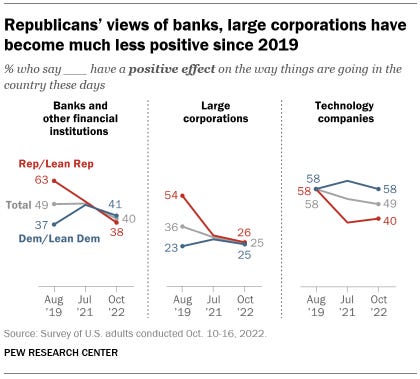
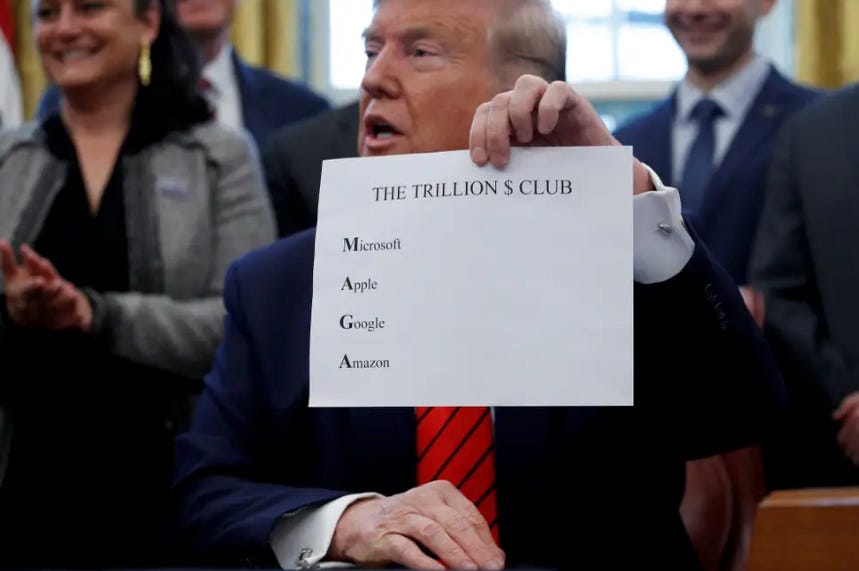
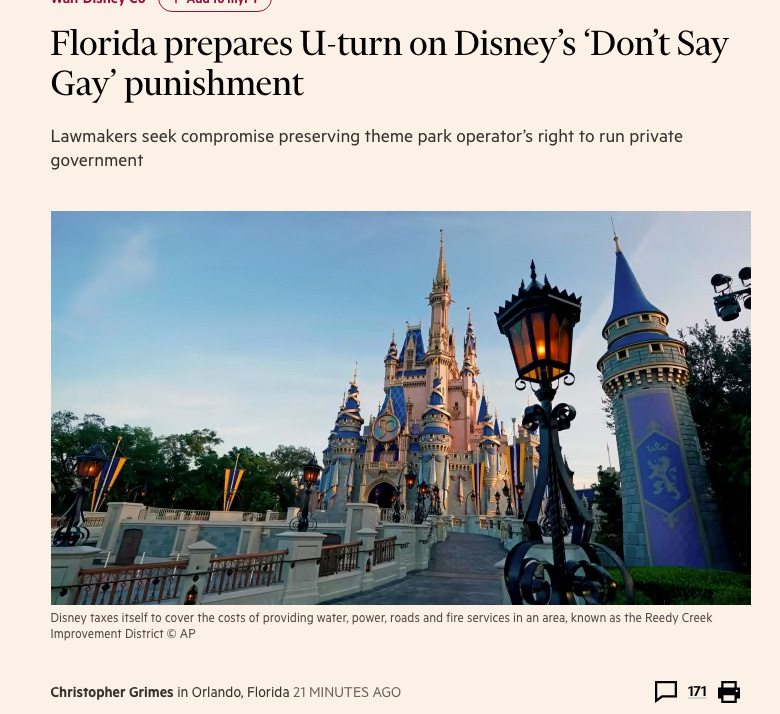
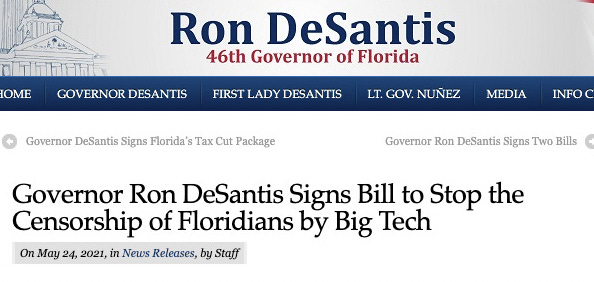
Such irony! Trump holding up a sign of four Big Tech companies in "anger" after rubber-stamping
their exclusion from our progressive income tax system, using their data to get elected, and approving multi-billion dollar contracts that benefit them. I guess he really believed his own B.S. that the R Tax Con was a "Middle-Class" tax cut that would "hurt people like him", cause 6-7% economic growth, and eliminate the Fed Debt and Deficits within eight years. All this magic in light of the 42 years R tax cuts that have never paid for themselves, created mega Fed debt and deficits, growing income and wealth inequality, and caused inflation and depressions. No wonder the Republicans aren't talking about small government and tax cuts any more. Now their con is removing CRT from grade schools and high school and banning math and Classic books. Give them credit for one thing: They really understand the people who vote for them.
Was it DeSantis that picked the fight with Disney, or was it a reaction to statements from Disney about the Florida law?
Also, maybe a little too nuanced, but the Disney CEO taking issue with the Florida law, Bob Chapek has been ousted by Disney. Yes, for a variety of reasons, but the comments of Bob Iger about calming things down seems instructive.
Is it possible that DeSantis has taken a rational approach in his actions? Does the firing of Chapek send a message to corporate America?